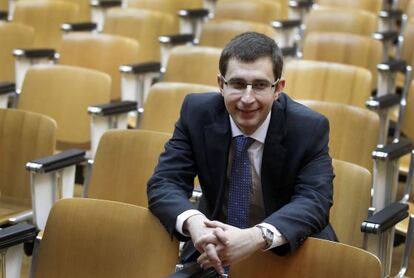The antidoping commandant
The Civil Guard who uncovered Puerto blood doping ring is the new head of Spain’s national agency

“‘Either the navy, or the Civil Guard,’ the kid told me,” says the father of 36-year-old commandant Enrique Gómez Bastida, the new director of the Spanish Anti-Doping Agency (AEPSAD). “For my son there was no other choice in life. However, when they refused him [for the armed forces] he wanted to leave it all behind. But I convinced him to try again and at 18 he went to the Civil Guard Academy in Zaragoza and he hasn’t looked back since. His determination is unique.”
That tenacity reached a climax on a May afternoon in 2008 when Gómez uttered the words: “Mr Fuentes, you are under arrest.” It was the culmination of the now-infamous Operation Puerto. Since that day, much like Spanish sport, Gómez’s career has been inextricably linked to the biggest police investigation the world has ever witnessed into doping in sport, although he would prefer to turn the page. “The fight against doping cannot live on special police operations alone. There is a lot more to it: prevention, education...”
One of Gómez’s first assignments as a civil guard was in Salou, Tarragona province, where, according to peers, he successfully employed imaginative methods to clear the streets of the drug dealers harassing tourists. “And I ended up in antidoping, right in the heart of it, although I had no previous interest in it,” he says. And he found his way to Eufemiano Fuentes, the sports doctor behind the massive Puerto blood doping ring, which implicated several of the world’s top cyclists and dozens of other sportspeople from athletes to tennis players to soccer players, through good old-fashioned police work: surveillance, wiretaps, hour upon hour of tediously monitoring suspects from a sunken car seat, and searches through trash cans.
The fight against doping cannot live on special police operations alone”
Previously a specialist in the trafficking and falsification of banned substances, Gómez uncovered with the help of a scientist a black market in the drug IGF-1 — used widely in doping — imported from Australia, repackaged in Spain and distributed. That was the seed of Operation Puerto, an investigation that eight years later is still pending resolution as the Madrid regional High Court considers the appeals of Fuentes and his co-defendants, who were convicted by a magistrate’s court last year.
Another facet of the case still pending is the coded blood bags supposedly corresponding to the athletes Fuentes counted on his client list. The AEPSAD, as well as the International Cycling Union, the Italian Olympic Committee and the World Anti-Doping Agency, has filed an appeal against the Madrid court’s decision to have the blood bags destroyed to protect the athletes’ right to privacy. If the judge accepts the appeal, it will be Gómez who is responsible for the subsequent DNA testing to identify whose blood they contained.
Gómez was hand-picked by his predecessor, Ana Muñoz Merino, who considered him the ideal man for the job and recommended his appointment to secretary of state for sport Miguel Cardenal. Despite leaving the Civil Guard’s UCO special operations unit shortly after Puerto, Gómez had become one of Spain’s leading experts in doping.
“The important thing is to investigate the entourage, the doctors and the trainers, because it is they who guide the athlete and disembowel the system; they are the enemy. It should never be the other way around. The athlete, in every case, should be an ally, not the enemy.”
Gómez’s appointment as antidoping chief is atypical, not just in Spain but worldwide: he is not a politician, a lawyer, a former athlete or a scientist. And that, given his singularity and lack of prejudices, may be a valuable asset. Anyone who thinks that Gómez, because of his Civil Guard training, might act as some sort of antidoping sheriff, obsessed with putting an end to the practice at any cost, is mistaken.
People who work with him say he views police operations as the antithesis to a genuine antidoping policy. Gómez, they say, will not treat the issue as just another pending matter, but rather try to change the mentality surrounding doping practices. If it has been possible elsewhere to put mechanisms in place to achieve the cooperation of athletes in facing up to the past, why not here? That, in any case, is the task Gómez faces.








































